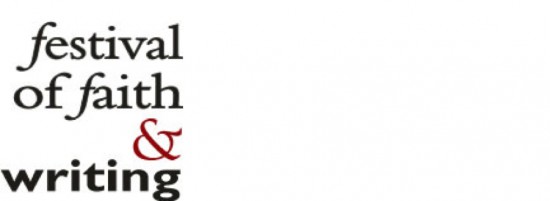THE PERILS OF WRITER’S CONFERENCES
I cannot quite make up my mind about Christian writer’s conferences. Without question the most recent Calvin College Festival of Faith and Writing offered an opportunity to spend time with friends and fellow kindred spirits, charitably discussing some tough subjects, sensitive subjects concerning faith and writing not amenable to the easy or glib answer. It was also an opportunity to hear and read some exciting and imaginative writing.
However, the incessant interrogation of process, the awkward mating rituals between art and commerce, and the amebic streaming of so many introverts into and out of claustrophobic classrooms and auditoriums seemed antithetical to the art, or at least how I practice writing.
Writing, for me, remains a painful and solitary affair; the slow bleeding of words onto paper becomes like engraving a text into a copper plate, a process more aligned with the life of a desert aesthetic than the witty repartee found at the typical author’s panel discussing say, place description as a form of character development or the effective use of humor in tragedy.
Bret Lott in an article about Flannery O’Connor wrote that she was, for him, one of the “Host of Witnesses that went before.” I believe Lott intentionally used this Biblical quotation to engender both the sense that no writer writes in a vacuum, that we all stand on the shoulders of those who wrote before us, and it is within this community of “witnesses” that we are provided a measuring stick against which work should and will be judged. But Lott notes the Host keeps getting larger as we enlarge our own communities, our host becoming both the dead who went ahead and the living who travel alongside. All writer’s function, it seems, within a community context—however limited or dysfunctional—of past influences and present contexts consisting in our family, friends, students, teachers, mentors, and colleagues as well as our intellectual heritage. But what I think Lott also suggests is he, and by implication all writers, are in some way accountable to this “Host of Witnesses.”
This idea of a “Host of Witnesses” to which a writer or artist is beholden or accountable is is foreign to the mainstream notion of the modern artist. That is, a totally free individual creating art without ties to ideology or institutions or individuals.
In my living room is an astounding color reduction woodcut of an Iris created by Gordon Mortensen. This little known artist, now in his seventies, has lived for many years as a near recluse on the Monterey peninsula. I was fortunate to meet him some years ago and although painfully shy, Mr Mortensen did not feel his isolation from an artist community had been a bad thing. In fact, just the opposite. “I put all my energy into creating what I imagined and none into what other people imagined I should imagine.”
Fiction writer Cormac McCarthy famously isolated himself for years in motels as a type of literary monasticism. Further, once famous, he avoided the literary world, eschewing other authors, interviewers, and critiques. When queried about this behavior, the quarrelsome Mr. McCarthy thought that you could not become a “worthwhile writer” without such isolation.
My personality is balanced at the Meyers-Briggs midpoint: neither a full-fledged extrovert nor a card-carrying introvert. Yet, I am also a writer who spends significant chunks of each day alone performing exegesis upon imaginary characters or long forgotten memories. I compound this insanity—or perhaps clinically verify the fact— by actually committing to paper these internal conversations. Long solitary sojourns into stories at times resemble looking out of a space capsule towards a beautiful but distanced earth. After a long day documenting the messiness of my past or an imaginary character’s life, I often find myself grateful to be a voyeur, experiencing considerable pride when none of the character’s splatter got on me, that I did not have to justify my words or defend my judgments.
I was dwelling in just such a pleasant self-righteous place late on the first day of the Festival conference. I had left a talk by an author whose particular journey I was quite grateful and it must be admitted proud that I had not experienced. The last session of the day was to be a conversation between two very successful poets, Jeanne Murray Walker and Luci Shaw.
But rather than share their poetry, these two old friends spoke about their own ambition—both the good and bad. While these wise women gave a plethora of good advice, I was struck how each had created poetry—an intensely solitary undertaking—while embedded and dependent upon an accountability inherent in the day-to-day messiness of family and friends and colleagues.
In addition to my being both an introvert and extrovert, I am also a modern and therefore averse to the entire concept of accountability, especially to any “host of witnesses” and particularly to the living kind who just might disagree with me and worse, ask me to justify my words. After forty years of marriage I am convinced that being accountable is a great and necessary idea in principle but is a dicey reality to implement, a reality accomplished only by multiple gifts of grace. However, I am being dragged to the understanding that despite my reluctance and inability to explicate how, as an artist and especially an artist who professes faith I am not exempt from accountability. This accountability will not, if my previous experience is any measure, be natural or easy or without pain. No doubt, this will be a process requiring equal amounts of humility and grace.
I don’t much like to admit this idea but it may be possible, in addition to extricating ideas and stimulation, I need to go to the Festival of Faith and Writing for a measure of accountability. I know that if in two years I do not go to the Calvin conference my absence will be noticed by friends. I also know that I will be asked, “what are you writing” and will have to give an accounting. This is not much, I admit, in the total schema of “faithfulness“ accounting. However, as Jeanne Walker gracefully points out in her poem, The Failing Student, “. . .mercy can start as little more than a direction you can move in.” So I suppose, can faithful accountability.
Why Did I Wait So Long to Read This Book? a review of Simone Weil’s “Waiting For God”
How does one offer an opinion much less a critique of a “classic” book? A number of my mentors, thoughtful friends, and respected teachers have noted Simon Weil’s influence and have urged me to read her essays–but I resisted. I confess now my reluctance sprang from suspicion, an unfounded suspicion as it turns out that Simone Weil was simply another spiritual fad. It was the admonition by a respected friend to not buy the book unless I was prepared to be seriously challenged that, of course, was bait needed to spur this “contrarian” into a purchase. Warren Farha, the wise owner of Eighth Day Books, smiled as he handed me “Waiting for God” and said, “an all-time read.” And so it was.
My first reading occurred during a long day of air travel. This long and uninterrupted time to read was fortuitous. This is a book reading that cannot be digested quickly, needs frequent review and pondering of sentences and paragraphs, and does not tolerate interruption.
The irony of reading a starving young aesthetic’s painful and honest thoughts about wholly loving God while cruising at 30,000 feet was not lost, Weil’s thoughts about beauty seemed prophetic as we flew over the Rockies at sunset. “The love we feel for the splendor of the heavens, the plains, the sea, and the mountains, for the silence of nature which is borne in upon us by thousands of tiny sounds, for the breath of the winds or the warmth of the sun, this love of which every human being has at least and inkling, is an incomplete, painful love, because it is felt for things incapable of responding, . . . Men want to turn this same love toward a being who is like themselves and capable of answering to their love, of saying yes, of surrendering. . . . The longing to love the beauty of the world in a human being is essentially the longing for the Incarnation. . . .The Incarnation alone can satisfy it.”
As a teacher, I think the essay “Reflections on the Right Use of School Studies with a View to the Love of God” should be required reading for all students and teachers. However, be forewarned. Weil would not be a fan of “No child left behind” or for that matter, much else on our contemporary educational scene. For instance these politically incorrect words, “Quite apart from explicit religious belief, every time that a human being succeeds in making an effort of attention with the sole idea of increasing his grasp of truth, he acquires a greater aptitude for grasping it, even if his effort produces no visible fruit.” Weil was no Thomas Dewey-oid utilitarian educator.
Weil is much quoted but I suspect like many thoughtful writers exploring difficult topics is less often read. In addition, to quote her thoughts on education or art without including her clear call for expanded compassion and service and suffering is to misconstrue by omission. Her prose is of an old fashioned and slightly inhospitable academic style, an odd combination of rigorous philosophic rationalism combined with an unapologetic mystical sensibility. Perhaps, some of the lumpy sentences would become more lyrical if read in the original French.
To be clear, I view this review as a first pass on Weil’s thought. I hold my first two readings of “Waiting for God” as insufficient to understand all of what this thin volume holds. Yet, there is a thick and compelling force in Weil’s words, a wisdom beyond what is possible to say and a palpable presence encrusting her printed words. Weil does not treat easy subjects and offers no pat “bullet-point” answers. The faith she describes speaks of suffering more than certainty and acts of contrition rather than acts of assertion. Like Flannery O’Connor, Weil the artist “uses[her] reason to discover an answering reason in everything [she] sees. . . to find [truth] in the object, in the situation, in the sequence.” Weil treats her words as art rather than utility. And as she points out, “Every true artist has had real, direct, and immediate contact with the beauty of the world, contact that is of the nature of a sacrament.”
Sacraments are visible rites that signify and make present the grace of God. How like the God who favored children, the dispossessed, and the lowly to use a young woman’s words in the midst of war as a vehicle for grace. A woman who had virtually no impact while alive and did not feel worthy to partake of God’s sacraments has become the means by which others, and I am in that number, have found a far richer and larger available stock of reality.
On the Possible Benefit of Resentment?
April has been a busy month.
For starters, I traveled to San Juan de laguna, Guatemala as a part of a medical team and after a quick turnaround in Durango, my wife Terry and I spent this last week in Grand Rapids, Michigan attending the Calvin College Festival of Faith and Writing and visiting old medical school friends.
In the space of thirty days I had a remarkable convergence of my medical, writing, and personal life. And while I suspect I will be unpacking this experience for some time, I have made some interesting and disturbing discoveries about myself.
First, and probably not an unusual discovery for any American physician going to the third world, practicing medicine for folks with desperate treatable needs, without governmental paperwork, insurance considerations, or malpractice lawyers reminded me of why it is I love medicine and why I am reluctant to stop. The ability to immediately relieve pain and suffering for fellow human beings is a rare privilege indeed and one I too often forget. While many of my friends good-heartedly offered up accolades for “going abroad” or “giving back” or my “generous spirit,” I must confess that I received far more than I gave.
Second, I am pretty soft and entitled. Beyond my nearly erotic enjoyment of a hot shower after a week with cold or the sensuous luxury provided by good books read and discussed or the blessings of kindred spirits with whom to share or the gift of friendships proven true over forty years or even the precious physical and emotional space necessary to consider the presence enfolding my words, I have much to be thankful for.
Yet, while decelerating this week in Durango, sorting Guatemala slides and reading the many post Festival blog posts and essays (after all, it was a conference of writers) a nagging irritation intruded like frigid air under the door jam. In the midst of warm memories, new friends, and a plethora of ideas I was resentful.
To be clear, this was not the more common resentment genus provoked by “bad ambition,” a fame virus discussed at the conference by poet Luci Shaw. Nor was my pique the result of pernicious vainglory, a validation-need common among writers, performers, and physicians. To be sure, these more common vices are well known to me, companions to the avarice and arrogance that I’m forced to confess far more often than I care to admit. But, not this time. Rather, for the first time, I resented my age.
I would suppose I possess similar trivial disgruntlements as do most folks who pass sixty: I am stunned to see my aged father in the mirror every morning, I no longer trust my achilles to play basketball, and remain surprised just how much slower I am scrambling off the floor than my grandson. But while I dislike and disapprove of the many changes my body has undergone these last years, the resentment I have is less like the loss of something I once possessed and more like an impatience for what is to come—a future I suspect I will not live long enough to share.
Seeing immense but solvable medical challenges, hearing incredibly bright young Christ followers craft insightful words and form new communities, sensing the gathering of a critical artistic mass within the church, discovering a rabbit warren of intellectual and artistic paths I want to explore all make me excited and sad and resentful. I know there is not enough time for it all. I know—well, not exactly—that I have fewer days ahead than behind.
Please, these are not, or I hope they are not, the sentimental musings of an old man. I am one of the luckiest guys I know, accomplished some things, and have relatively few regrets. I am also not naive about the dangers facing this world, the multiple ways we are and can continue to go, “off the rails.”
But these last days have been an eye-opener. Everywhere I look I see God’s grace budding like a pear tree’s white blossoms. I used to stand in my church and wonder if there were any other Christian artists and now in ways I would have thought impossible five years ago Christians are wondering how the beautiful informs the true. I am disgruntled because I want to see and be in the middle of how all this plays out, how it will be for my grandchildren and their children, I want to engage in making Guatemala’s water cleaner and their kids healthier, I want to be used by and in these new faith communities I see coming, and I want to craft beautiful words that describe and honor this coming and widening world, this “increasing stock of creation’s reality.”
Perhaps a little resentment isn’t all bad.


